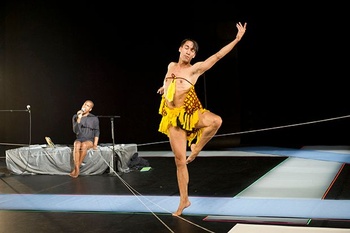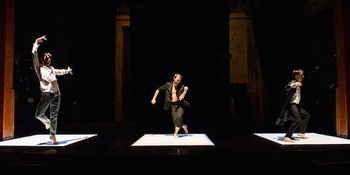The New York choreographer Trajal Harrell explores possible interconnections between voguing and more conventional forms of dance and theatre. In Antigone Sr., he tackles Greek Classical theatre, with a particular focus on relations between men and women.
Trajal Harrell has already come up with seven shows (and there are more to come!) about voguing, the predominantly black dance style from the Harlem ballroom scene that really took off in the late 1980s, although it had its roots in the early 1960s. In this series of performances, Harrell explores voguing alongside a variety of trends in dance and theatre.
Harrell began with postmodern dance, and specifically with the Judson Dance Theatre. That semi-legendary group of performers – Steve Paxton, Elaine Summers, and Yvonne Rainer – staged groundbreaking shows in Manhattan in the early 1960s. Harrell explains: “My original starting point was: what would have happened if someone from the voguing scene had headed downtown in 1963 to perform with the early postmodernists? That would have involved migrating to a different district in the city where the power relations were completely different. For example, the choreographers and dancers in Judson had greater resources for the production and distribution of their work. How might that new relationship influence the work? Blues, after all, changed completely as a result of rock and roll.”
Voguing is more complex than we realised.
Trajal Harrell: Most people think of Madonna or of club voguing. But it’s actually a way of life, a subculture with its own codes, not just a dance. In the early Sixties, voguing emerged on the drag queen scene: transvestites went in for role-playing, imitating divas. Later, it developed into an intense social competition in which people compete for trophies. Unlike an art performance, voguing is a real battle in which not only dance and costume, but also the competitors’ social position, sexuality, and general attitude play an important role. It involves, moreover, a large group of people devising and putting into practice their own dance idiom and their own way of thinking about performance. Although it has a political aspect, voguing remains extremely marginalised. Theoretical works about contemporary dance simply ignore voguing.
Trajal Harrell: voguing with Sophocles

Antigone Sr./Twenty Looks or Paris Is Burning at The Judson Church [L] looks at Classical Greek theatre. What are the overlaps between Sophocles’s text and voguing?
Harrell: I zoom in on the ways in which men played both male and female parts, and how that is close to voguing in some ways. The way I see it, Sophocles wrote Antigone because he wanted to start a debate about the civil rights of women in Greek society. But in productions in Antiquity, it was played by men dressed as women. So they used their performativity to push certain political questions. That happens with voguing too. In Antigone Sr., we tell the story of Antigone in an unconventional way, borrowing elements from voguing in the process. Not just a few dance movements, but the whole mindset is involved. How would voguers have tackled a dance piece in ancient Greece? Don’t get me wrong: we were trying to come up with something that wouldn’t end up camp or as a drag show, not that there is necessarily anything wrong with that.
Your work has been particularly well received in the US. “The Next Martha Graham Has Arrived!” read a Huffington Post headline in 2012. A compliment?
Harrell: I do have a lot of respect for Graham and what she did. For my part, I have contributed a flair for drama and emotion, something I have found lacking in the contemporary dance landscape. Back in the 1980s, Rosas and Anne Teresa De Keersmaeker put emotion into minimalism. I added a different sort of drama – which gave me this title.
Harrell: I zoom in on the ways in which men played both male and female parts, and how that is close to voguing in some ways. The way I see it, Sophocles wrote Antigone because he wanted to start a debate about the civil rights of women in Greek society. But in productions in Antiquity, it was played by men dressed as women. So they used their performativity to push certain political questions. That happens with voguing too. In Antigone Sr., we tell the story of Antigone in an unconventional way, borrowing elements from voguing in the process. Not just a few dance movements, but the whole mindset is involved. How would voguers have tackled a dance piece in ancient Greece? Don’t get me wrong: we were trying to come up with something that wouldn’t end up camp or as a drag show, not that there is necessarily anything wrong with that.
Your work has been particularly well received in the US. “The Next Martha Graham Has Arrived!” read a Huffington Post headline in 2012. A compliment?
Harrell: I do have a lot of respect for Graham and what she did. For my part, I have contributed a flair for drama and emotion, something I have found lacking in the contemporary dance landscape. Back in the 1980s, Rosas and Anne Teresa De Keersmaeker put emotion into minimalism. I added a different sort of drama – which gave me this title.

(© Ian Douglas)
You have already made seven shows about voguing. Are you going to do even more in the future?
Harrell: Sure. The most recent shows – one was premiered at the MoMA and I’m getting the other ready for Montpellier Danse at the end of June – look to Butoh, a famous traditional Japanese dance form, and voguing. I have also been developing more and more theory: that is going to result in a publication – the subject badly needs a framework. Since I discovered voguing, whole worlds have opened up for me, away from the standard conceptual, postmodern history. I’m probably going to remain obsessed with it forever.
ANTIGONE SR./TWENTY LOOKS OR PARIS IS BURNING AT THE JUDSON CHURCH [L] 2 & 3/4, Kaaitheater, www.kaaitheater.be
You have already made seven shows about voguing. Are you going to do even more in the future?
Harrell: Sure. The most recent shows – one was premiered at the MoMA and I’m getting the other ready for Montpellier Danse at the end of June – look to Butoh, a famous traditional Japanese dance form, and voguing. I have also been developing more and more theory: that is going to result in a publication – the subject badly needs a framework. Since I discovered voguing, whole worlds have opened up for me, away from the standard conceptual, postmodern history. I’m probably going to remain obsessed with it forever.
ANTIGONE SR./TWENTY LOOKS OR PARIS IS BURNING AT THE JUDSON CHURCH [L] 2 & 3/4, Kaaitheater, www.kaaitheater.be
Read more about: Podium
Fijn dat je wil reageren. Wie reageert, gaat akkoord met onze huisregels. Hoe reageren via Disqus? Een woordje uitleg.